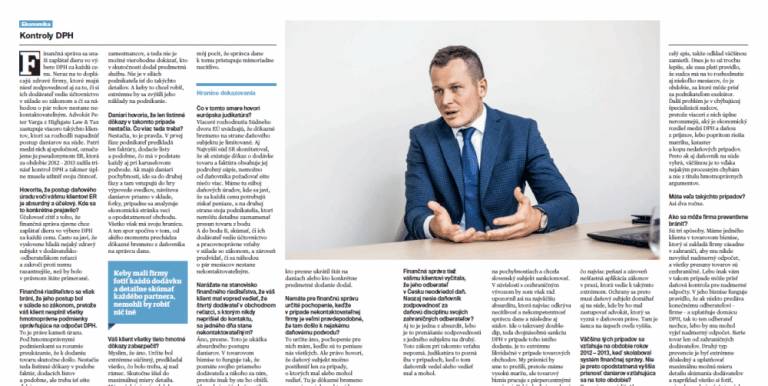
Peter Varga gave an extensive interview to Trend magazine on tax audits.
The main trigger for this topic was the recent experience of a client of our law firm, Highgate Group, for whom the recent disproportionate VAT tax controls have become almost liquidating.
Given that this is very likely not an isolated case (alongside some others in which we have acted for clients), but a systemic problem, there was a need to highlight this issue and the practice of the Revenue.
Within the Highgate Group, we now manage the accounts of approximately 100 VAT-registered companies.
We can confirm that VAT audits occur much more frequently than income tax audits (for example, in relation to illegal tax optimisation). VAT is the main source of revenue for public budgets in Slovakia. It is the most profitable tax and only the income from social contributions is more significant for the state.
If we analyse the period of the last 10 years (cash methodology), VAT has on average a 44% share in the total tax revenues of the state.
By comparison, corporate income tax only accounts for 18% of the state’s revenue.
The second reason for which it is possible to understand why the state places so much emphasis on VAT is the problem of the so called “VAT”.
VAT loophole.
This loophole represents a kind of estimate of VAT evasion, as VAT is ranked by the State as one of the most risky taxes in terms of tax evasion. The peak of inefficiency of VAT collection in Slovakia was in 2012, when the VAT tax gap reached 40% of the VAT collection potential. Today, the gap is much smaller, reaching 26.9% in 2018. This is a relatively significant step forward, and this is also the reason why the state has decided to relax some of the institutes of the VAT Act (for example, the abolition of the mandatory security).
While one can generally agree with the dynamism and emphasis that the state has placed on VAT collection and related tax controls in recent years, this approach has its limits. And it seems that in many cases these limits have been exceeded, which should not be the case in a state governed by the rule of law. And it is up to the courts to be able to identify those limits reliably and consistently and thus cultivate the much-needed legal certainty in the business environment.
You can read the full article, including the interview, at the following links:
Law & Tax
Tomas Demo
tomas.demo@highgate.sk
Accounting
Peter Šopinec
peter.sopinec@highgate.sk
Crypto
Peter Varga
peter.varga@highgate.sk